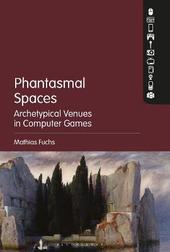
|
Phantasmal Spaces: Archetypical Venues in Computer Games
Hardback
Main Details
| Title |
Phantasmal Spaces: Archetypical Venues in Computer Games
|
| Authors and Contributors |
By (author) Professor Mathias Fuchs
|
| Physical Properties |
| Format:Hardback | | Pages:176 | | Dimensions(mm): Height 229,Width 152 |
|
| Category/Genre | Theory of art
Computer games design
Digital animation |
|---|
| ISBN/Barcode |
9781501332920
|
| Classifications | Dewey:794.801 |
|---|
| Audience | | Postgraduate, Research & Scholarly | | Professional & Vocational | |
|---|
| Illustrations |
17 bw illus, 2 tables
|
|
Publishing Details |
| Publisher |
Bloomsbury Publishing Plc
|
| Imprint |
Bloomsbury Academic USA
|
| Publication Date |
13 June 2019 |
| Publication Country |
United States
|
Description
Recognizable, recurring spatial settings in video games serve not only as points of reference and signposts for orientation, but also as implicit sources of content. These spatial archetypes denote more than real-world objects or settings: they suggest and bring forward emotional states, historical context, atmospheric "attunement," in the words of Massumi, and aesthetic programs that go beyond plain semiotic reference. In each chapter, Mathias Fuchs brings to the fore an archetype commonly found in old and new digital games: The Ruin, The Cave, The Cloud, The Portal, The Road, The Forest, and The Island are each analysed at length, through the perspectives of aesthetics, games technology, psychoanalysis, and intertextuality. Gridding these seven tropes together with these four analytical lenses provides the reader with a systematic framework to understand the various complex considerations at play in evocative game design.
Author Biography
Mathias Fuchs is Professor at the Institute of Culture and Aesthetics of Digital Media at Leuphana University of Luneburg, Germany. An artist as well as media scholar, Fuchs pioneered the artistic use of computer games and has exhibited work at ISEA, SIGGRAPH and the Millennium Dome. He is the editor of Diversity of Play (2015) and co-editor of Rethinking Gamification (2014).
ReviewsMathias Fuchs ventures into a fascinating range of art-historical, literary, film and philosophical references to analyse the function of archetypal experiences of various spatial environments commonly found in computer games. * Burlington Contemporary * A major new work in game aesthetics: Fuchs neatly sidesteps the stale isolationist dogma of game studies by treating videogames as entwined within the same cultural and psychological forces as other artworks. And about time too! * Chris Bateman, game designer and author of Imaginary Games (2011) * Mathias Fuchs's new approach to the analysis of computer games makes us aware of how much of the spaces occupied by players are in fact dreamscapes, places of phantasmal qualities. The book aims way beyond the 'spatial turn' in game studies and approaches spaces as lived-in phantasms. Full of insights and surprising observations, Phantasmal Spaces is a complex yet widely accessible contribution to the study of our own imagination in times of digital media. * Markus Rautzenberg, Professor of Philosophy, Folkwang University of the Arts, Germany *
|